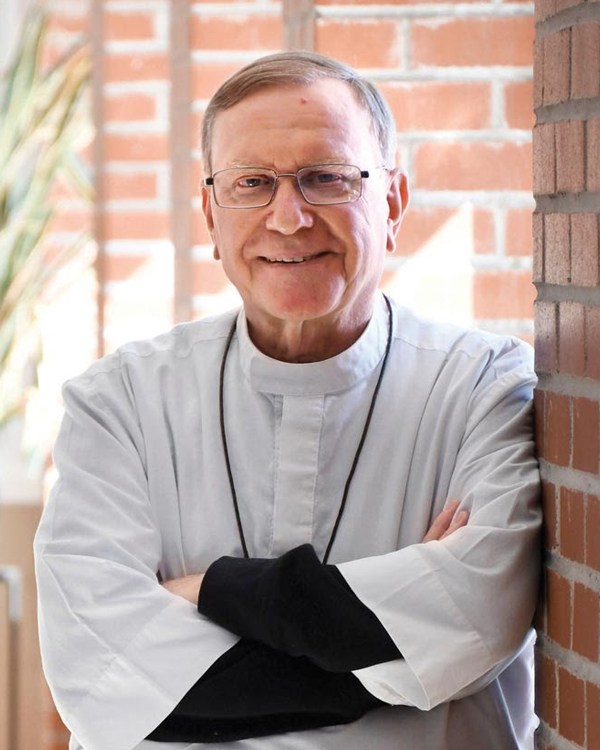Meet Father Robert Barringer, CSB
Basilians have a talent for recognizing people’s gifts and encouraging others to come forward.
Father Robert Barringer’s, CSB priestly ministry spans education, formation and administration on three continents. Through his cross-cultural experiences he’s gained a fresh perspective on the Church.
Father Barringer was born in north Toronto, Ontario into a large family of nine children, of whom eight were boys. His family attended Mass every Sunday and said the rosary, but family life was not particularly centred around devotions. The family moved a few times, including a stint in Hollywood, where the usually reserved Bobby finished his career as a child actor which had begun in Toronto at the age of eight.
He returned to Toronto for his final year of high school and graduated from the Basilian-run St. Michael’s College School. After high school he entered the Erindale novitiate. “It was the biggest change in my life. I realized I did not really understand what it meant to be a Christian and what was involved for me as a person. For the first time, I read the whole Bible and was taught how to pray,” he said. “It was one of the happiest years of my life. It was certainly not dramatic, but everything just seemed right.” Confident in his decision to continue in the formation process, he made his first profession of vows on September 15, 1963.
As a scholastic, he earned his Bachelor of Arts from the University of Toronto. He then received a Rhodes Scholarship to study at the University of Oxford where he did three years of theology and went on to spend a year at the Theological Institute of Bucharest in Romania. He found that as a Western Catholic studying theology while surrounded by the world of the Eastern Orthodox Church, he came to a strong sense that the Eastern and Western traditions were much more in communion with one another than opposed to each other. This worldview has deeply influenced his teaching and he doesn’t shy away from including other denominations and faiths in his courses.
He gained his first experience teaching theology at the University of St. Thomas in Houston, Texas prior to his subsequent ordination on May 18, 1974 in St. Basil’s Church in Toronto. Following his ordination, he returned to Oxford University for his doctorate in Theology.
He came back to Toronto in 1978 to teach at the University of St. Michael’s College in the role of what he terms as that of a “bullpen pitcher”, replacing professors in a variety of areas who were away on sabbaticals. In this role he was granted more freedom than if he had been hired to teach in one particular area by the religious studies department. He was able to design two new courses – one on Liturgy and the other on Spirituality – which used elements from each of the Eastern Orthodox, Roman Catholic, and Protestant Church traditions. The courses proved to be very popular among students from the different college denominations present on the University of Toronto campus.
In 1990, he was appointed president at St. Joseph’s College in the University of Alberta in Edmonton. At the 1993 General Chapter the community elected him superior general. It was during this term that the Congregation began a Synodal Process to determine whether the Basilian community really wanted to be a religious order or a less formal association of diocesan priests, a matter not to be determined by the General Council, but rather through a community-wide grassroots process. In 1996, all Basilians were expected to attend a gathering held at St. John Fisher College in Rochester, New York, which would bring the Basilian Synodal Transformation Process to its conclusion. Over 400 Basilians attended, making it the largest ever gathering of Basilians.
After his term, he gave the new superior general a list of ten jobs he was willing to do but which he could not find anyone to fill while he himself had been superior. The Council chose to send him to Bogota to be responsible for the formation of the young men joining the Congregation in Colombia. While there he also taught at the Pontificia Universidad Javeriana, a Jesuit university, and at the Archdiocesan major seminary, once again as a replacement for those away on sabbatical.
In 2003, he became the regional superior of Colombia. He remained in the country until 2006, when he was appointed as novice master for a proposed new Basilian international novitiate. His unique experience as a Spanish speaking North American with experience in both Colombia and Mexico made him an evident choice, but the proposal ultimately fell through and instead he functioned for a year as master of novices in the small North American novitiate in Sugar Land, Texas.
When the novitiate was over, he was asked to take on teaching responsibilities at the University of St. Thomas and became the local superior in 2008. In 2010, he was appointed as dean of studies at St. Augustine’s Seminary in Toronto, Ontario.
He returned to Colombia in 2014 as assistant novice master at the novitiate in Santa Marta and then became master of scholastics in Medellin in 2015. He returned to Canada in 2020 for what he thought would be his retirement, but instead was appointed president of St. Augustine’s Seminary, a position he held until June 2022.
Drawing upon the imagery of his acting days, Father Barringer sees Basilians functioning more generally as supporting actors, rather than as leading actors and “stars”. “Basilians have a talent for recognizing people’s gifts and encouraging others to come forward.” He has experienced this talent in his own life when the community has seen past his shyness and encouraged him to step into roles that require a spotlight.
No matter the role, whether as superior general, sabbatical replacement, or heading up formation programs, his approach is the same: he discovers what needs to be done and brings a willingness to give himself to the task.


